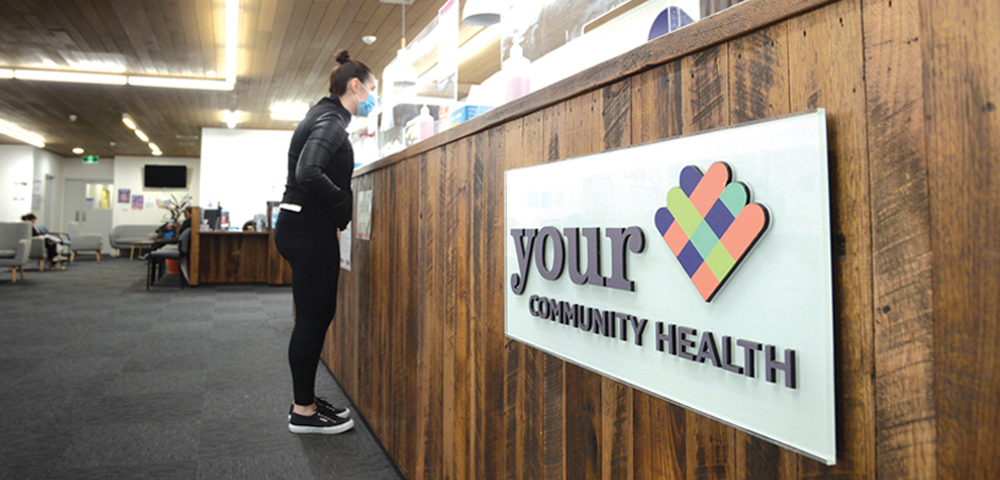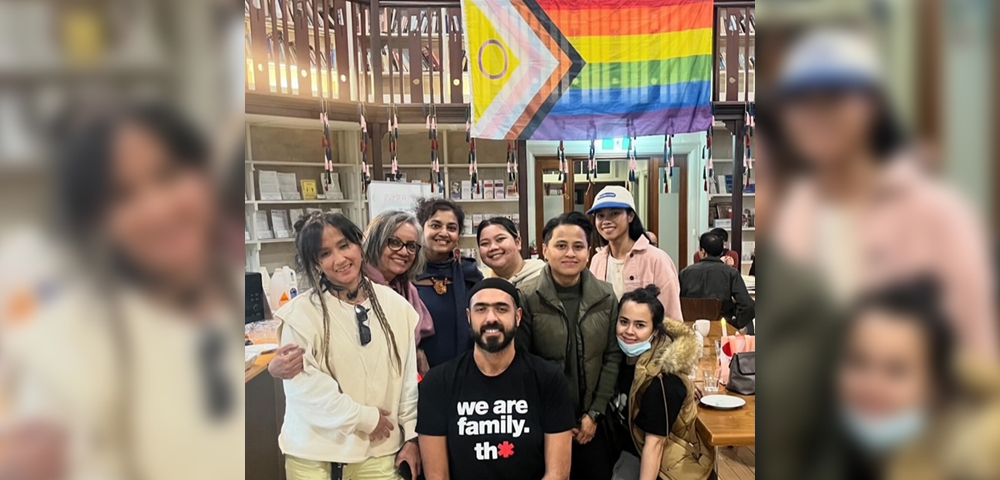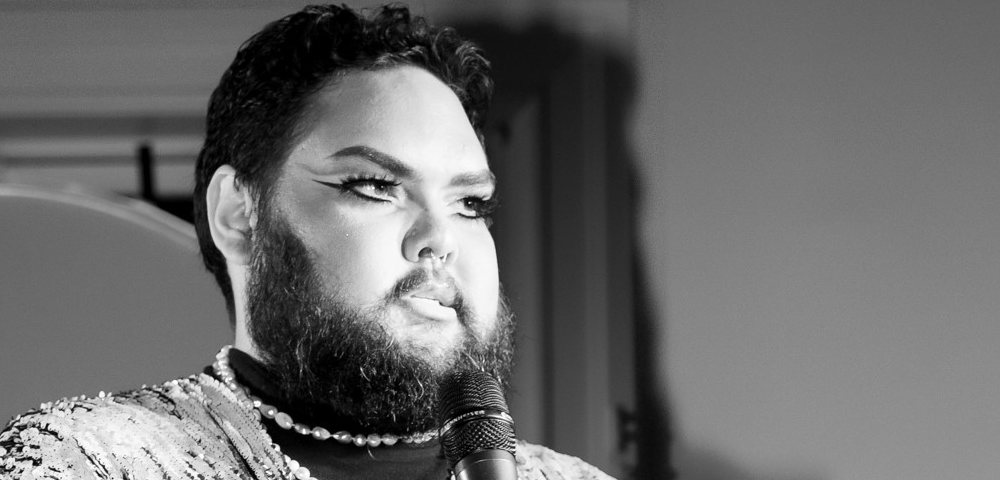
Screaming away at the homophobes

INTRODUCING Jonathan Mark Waters.
He is a huge fan of Ke$ha and loves the over-the-top nature of Lady Gaga. He will unashamedly dance along to Britney Spears and can quote Mean Girls like it’s no one’s business. He was also once the proud owner of a massive mohawk that sported all colours of the rainbow. He is a self-confessed queen of selfies and admits to being “pretty flaming”.
However, he manages emerging and Brisbane-based heavy metal band Chronolyth, is a metal music journalist and has been a devotee of the genre since a very young age. He even has sub-dermal silicone implant modifications on his left hand.
Still trying to reconcile the two extremes in your mind? You shouldn’t have to, because as Jonathan (pictured above in grey shirt) explained, metal has come a long way from its early days. So much so, he believes this particular musical scene and style was not as “scary and brutal” as it once was — and not as homophobic.
Ever since being introduced to a harder style of music at the age of six, sitting in one of his sister’s rooms listening to Marilyn Manson, Slipknot and Metallica, he knew the genre was the one for him.
“I remember when [my sister] was going through her angry grunge girl stage. She had no female friends and was the biggest tomboy ever,” Jonathan said.
“I remember sitting in her room which always reeked of cigarettes listening to those bands and it’s just always remained as a steady medium in my life.”
On why the harder style of music appealed to his younger self, Jonathan said his personality clicked with metal. In addition, because he was classically trained in music, the particular musicality of the genre was appealing.
“I was a little bit of a weird kid. I was always fairly morbid, but I think was a little too young to understand the theme of the genre. But the musicality of metal such as the guitar rifts, tones and musical layers appealed to me,” he recalled.
“Most of the kids in my family were classically-trained musicians and I had been learning woodwind since I was six. It was really the technical side of metal that appealed to me in the first place rather than the lyrics or messages.”
Jonathan’s growing awareness of his sexuality attracted him to particular metal artists who were challenging some notions of heteronormativity.
“I didn’t have any concept of sexuality or desire, I just knew that girls were gross,” he said.
“The whole concept of challenging the norm was awesome and really appealing to me. It’s one of the reasons I got into metal in the first place.
“Everything else in the music scene was really binary and boring. Metal just really stood out.”
Marilyn Manson was a huge inspiration, especially because of the ways in which he bent gender roles and images in his earlier work.
“I remember when I was seven or eight when Tainted Love came out and that was the most awesome video clip ever for me,” Jonathan recalled.
“There’s a scene where he appears in lingerie on a bed pillow fighting with girls and I just thought to myself, that is pretty god damn awesome.”
His first real experience of homophobia came after a move to the Gold Coast just before starting high school. The recipient of bullying due to his flamboyant yet open nature and attitude, Jonathan instead used his confidence to turn the abuse on its head.
“I loved it, though. Because I had no friends and was that new kid on the block, instead of doing what most people do and become really reclusive, I hit back a lot more than what I should have,” he said.
“I was really well spoken as a kid and was used to standing up for myself with all my siblings. So I just dished it out 10 times better than what I got.”
A fan of journalism, his first official move into the music industry came after he was approached by someone who worked for online metal music magazine The Metal Review to see if he would write for it. Jonathan is now a co-owner in the Australian division of the global magazine.
He said he struggled to be taken seriously during his first years in the metal industry, primarily due to his age rather than his sexuality, but as his involvement deepened it was inevitably broached.
“A lot of people in the scene really disliked me because I was so flamboyant and outrageously homosexual. It was awesome,” Jonathan said.
“I think a lot of people were just taken aback by me due to no one really being ‘out’ in the metal scene, and I don’t think there has been anyone as out as I am in Brisbane for a very long time.”
His confidence and defiant nature served him well during these years as he struggled to find genuine friends within the metal scene who did not care about who he slept with or use him for his professional contacts.
“I’m not afraid to shy away from confrontation. I have authority problems and I don’t take bullshit. That is my life motto,” he said.
“I wasn’t afraid to take someone by the balls and twist them in the most non-sexual way possible.”
After finally finding a welcoming and friendly place for himself within the metal scene and industry, the only homophobia he continued to experience was from random scene punters, who according to Jonathan “weren’t regulars, who never really went to any gigs and were just there to drink and start fights”.
The issue of encountering homophobia in the metal scene was initially a strange discovery for Jonathan. Along with other fans and even academics studying the music genre, he believed that overall, metal was fervently defiant of authority and societal norms.
“Encountering homophobia in the metal scene was fucking weird,” he said.
“It was just so shocking to the system. Many in the metal scene pride themselves on being alternative and being very counter-cultural. Acceptance is a major thing within the community and many bands promote that. It’s just mainly the random fly-by-nighters and randoms that turn up at gigs that cause problems.
“When it first started happening I was asking, is that really still a thing? Especially in this community? I thought every now and then, ‘I’m a homo but you have facial tattoos — what’s more ridiculous here?’”
However, Jonathan said he was fortunate to have only experienced very few cases of extreme homophobic abuse in the metal scene, with most coming from “drunken douches” at gigs who have physically and even sexually assaulted him.
Luckily, his tough and confident nature and supportive friends allowed him to brush off such attacks but he knew that for most LGBTI people out there, that sort of experience could be traumatising, and gave the metal scene a homophobic reputation.
The more old-school metal scene members have always been fairly reluctant to embrace homosexuality, as Jonathan believed they only accepted men as a brutish and strong form of masculinity.
“Guys like that now are just pure thrash metal elitists and their numbers are in decline,’ Jonathan said.
“They are really frowned upon a lot ‘cause no one likes a douche bag at a gig.
“Everyone’s there to just drink piss, have a great time and listen to music. When someone comes along and they just want to be all macho and idiot shit like that, they often find themselves alienated fairly quickly.”
This older structure also saw women as primarily sexual objects, and that has also held them back in gaining credibility within the scene. Yet as Jonathan pointed out, countless female metal and rock artists have finally made a name for themselves and believed it was time for LGBTI artists to similarly be taken seriously.
Despite this, Jonathan is not the first in the metal industry and scene to be open regarding their sexuality. Marilyn Manson never shied away from embracing a fluid nature to his sexuality, and many rock aficionados point to former lead singer of Judas Priest, Rob Halford, as a major gay metal pioneer.
It’s something that brings a smile to Jonathan’s face whenever he encounters older “metal heads” or emerging bands that expressed homophobic attitudes along the lines of the genre having no room for LGBTI fans and artists, but have no idea about the history of one of metal’s biggest and most influential bands.
“I’m always surprised to come across older >>
>> metal heads who had no idea Judas Priest were as gay as they were. Same with Steel Panther. They are super homo,” Jonathan said.
“Fresh meat in the metal scene is always awesome, especially if they’re in a band and have the whole douchey rock star mentality already.
“There was a Brisbane band who were of this attitude and were really against LGBTI equality and marriage rights. But one of their self-confessed biggest influences is Judas Priest,” he added.
“I love marinating in the irony of the metal scene sometimes.”
Other older LGBTI metal artists that have opened up about their sexuality include: Gaahl, former lead singer of Gorgoroth; Roddy Bottum of Faith No More; the frontwoman for Otep, Otep Shamaya; and Doug Pinnick from King’s X.
However, there have also been notable anti-gay voices from older metal bands that have caused issues for LGBTI metal fans. Lead singer and guitarist for Megadeath, Dave Mustaine, made headlines when he publicly stated his opposition to marriage equality due to his Christian beliefs.
Yet as Jonathan was keen to point out, Mustaine and his ilk’s views were rapidly on the way out of the metal scene.
“Dave Mustaine is such a douche bag. Colossal douche bag,” he said.
“He’s reaching his expiry date and the progression underway in the metal scene will soon completely silence his and fellow bigoted voices. He’ll soon be irrelevant.
“There’s a real paradigm shift within metal where it was once all about masculinity, blast beats and double kicks and all that sort of crap, to a place where it’s evolving into a platform for social messages that have recently included LGBTI issues.”
On the topic of newer metal bands, including openly-gay or bi members, Jonathan believed there was still a lot of progress to make. Fans were more accepting and bands more progressive, but trying to sell openly-LGBTI bands still proved to be an issue.
“Even though there are new progressive messages coming out in the metal, there’s still an overall feeling of metal being a very masculine genre,” Jonathan said.
“It’s very hard to sell queer metal artists. At the moment it’s not marketable at all. Certain subgenres in metal have very queer elements to [them] such as glam, heroic or power metal but for wider mainstream metal, though, it would be very hard to sell queer metal.
“And I think that’s one of the main reasons there aren’t many out metal artists or bands. In regards to me, I found that people didn’t take me seriously initially because I was a young gay man and I had issues asserting myself and making my voice heard.”
Being the manager of Brisbane band Chronolyth since last year has completely changed the way in which he was perceived in the industry — but not without a few speed bumps.
Professionals within the industry have suggested to him on numerous occasions to “tone down” his flamboyant nature, along with being as open as he was about his sexuality. Jonathan found this unacceptable.
“I get that all the time but I have an issue with compromising who I am and staying true to me,” he said.
“I don’t want to have to change who I am for professional reasons in order to be accepted by other people.
“I would rather people hate me for being a raging homosexual than be friends with a watered-down version of who I really am.”
Jonathan did have a moment where he was concerned that his nature and sexuality would impede on the success of Chronolyth, but his fears were allayed by one of the band members, guitarist Alex Nisiriou, during a conversation that they had while on tour in Canberra.
“I asked him if Alex and the band genuinely had reservations about me being openly gay and that I’m representing your band in a professional way,” Jonathan recalled.
“He said ‘fuck no’, which completely blew me back. He said how could he have an issue with me after I had done so much for the band already? He said, ‘your expertise in the industry is such a great asset, why could we care about who you sleep with?’
“To hear that from someone who is somewhat reclusive and hadn’t talked a whole lot openly with me was really amazing.”
In the meantime, throughout his time and involvement in metal, Jonathan has noticed a marked increase in the number of fans at gigs and people within the scene who are starting to open up about their sexuality, and barriers over stereotypes are knocked down, one by one.
“To have the ability to effect some change in perceptions of what sexuality is within the metal scene and what it means to be gay within the wider LGBTI community has been an amazing and rewarding experience for me,” he said.









